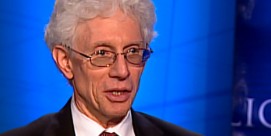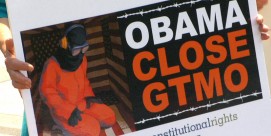In This Episode << SLIDE LEFT TO SEE ADDITIONAL SEGMENTS
Richard Land Extended Interview
Read more of Kim Lawton’s interview about Iraq and just war with Dr. Richard Land, president of the Southern Baptist Convention’s Ethics and Religious Liberty Commission:
Q: Three years ago you told us the U.S. would be morally justified going into Iraq. Do you still believe that?
A: Yes, I do. I think it’s one of the nobler and finer things we’ve done as a nation, and I think that it’s going to, in the end, produce a government in Iraq and a society in Iraq that is far more conscious of human rights and far more conscious of human freedom, and in the end it’s going to remake the Middle East.
Q: Three years ago, a lot of people were talking about Iraq’s imminent threat against us, and weapons of mass destruction were a big part of that. Does the fact the no weapons were found undermine the moral argument for going in?

A: My main justification for going in was never the weapons of mass destruction threat. It was part of a cluster of reasons for going into Iraq, and I think the administration made a mistake putting so many of their eggs in that basket. But, at the same time, I think the fact that we haven’t found them doesn’t mean that [Saddam] didn’t have them, that he wasn’t trying to maintain the ability to reconstitute them once the pressure was off. He had had them, and he had shown a willingness to use them against his own people and also against his neighbors. And while I never made an assertion of a connection between 9/11 and Saddam Hussein, there certainly were multiple connections between terrorist groups and Saddam Hussein, and the fact that there could be the possibility of cooperation that could lead to terrorist attacks against the United States in the future was one that I thought would be untenable for us to continue to countenance.
Q: Drawing on just war theory, what did you think were the justifications for this war?
A: You have to have a just cause. Our cause was not to conquer Iraq, but to liberate it. It was to defend ourselves and our allies from the possibilities of future attacks from a man who has shown a willingness to cooperate with and to train tens of thousands of terrorists and to give them safe harbor.
It also met the laws of proportionality. We have, I think, led to the saving of lives and not the costing of lives by going in. I mean, let’s remember that we have found mass graves of 350,000 dead Iraqis who were killed, often in horrible ways. That would have continued. Saddam Hussein would’ve continued to destabilize the Middle East, and in my own particular case I’ve always made the argument that Gulf War II was a continuation of Gulf War I. We had a cease-fire at the end of Gulf War I, and it was predicated upon Saddam Hussein complying with more than a dozen United Nations resolutions, which he repeatedly refused to comply with, and so after 12 years, we picked up the cease-fire and continued Gulf War I, which was started as a result of Saddam Hussein’s aggression against Kuwait.
Q: One of the criteria is a reasonable expectation of success. Are you satisfied we had that?
A: I think we did have a reasonable expectation of success, and I think we’ve had reasonable success. We’ve had three free elections in little more than a year in Iraq, elections in which, every one of them, more Iraqis as a percentage of their population actually participated in the election than participated in our presidential election in 2004 or our presidential election in 2000. The Iraqi people braved threats of violence, threats of retribution, threats of being killed, to come out and vote three times in this last year in rather impressive numbers, upwards of 70 percent in the last election, and we are on the verge of having a government elected by the people, representing the people, one of the most representative governments ever elected in the Arab world. We have an Iraqi army that is now in charge of half of Iraq in terms of day-to-day security and military operations, and it is estimated by our military and by their military that the Iraqis will be doing 80 percent of the front-line military and security action by September 1. We just had a military operation, a rather complex one, an airborne assault where 800 of the troops were Iraqi and 700 of the troops were American. So I think we did have a reasonable expectation of success, and we are, I think, reasonably successful.
Have there been bumps in the road? Of course. There are always bumps in the road. Projections go out the window when the first shot is fired. I think we would have to say, looking backward, that the actual liberation of Iraq went better than expected and the building of a democratically elected government in a country that is under a constitution has been more difficult than we had imagined it would be because of the insurgency. But I think it met our reasonable expectations of success, and I think we are going to be successful.
Q: Some ethicists who initially thought the war was justified under just war criteria now say that was mistaken. Does the just war ethic call for constant reevaluation, based on emerging facts?
A: The assessment now that it wasn’t justified is an easy one to make from the relative comfort of North America. Seventy-five percent of Iraqis think that their lives are better now than they were under Hussein and that their lives are going to be better in the future. I would say that armchair quarterbacking from the relative comfort of North America is one thing. Being there on the ground in Iraq is quite another. Every time the terrorists bomb the police station or the army recruiting station, before they can even clear the rubble away there are more Iraqis standing in line waiting to join to fight for their freedom. The Iraqis believe it was worth it; they believe they have a potential future now that is far better than the dismal future they faced under Saddam Hussein. They are living, they are dying, standing up and being willing to die for their country every day, and I believe we have a moral obligation to stand with them until they can defend themselves. When it comes to falling into chaos, the Iraqis don’t see it that way.
You know, if you listen to the Iraqis and talk to the Iraqis instead of just listening to the news reports that come from our major electronic media, you find a very different picture. I have talked to the Iraqis, I’ve talked to people in the government, I’ve talked to people in the country, and they’re quite encouraged about the future. We none of us like to see these levels of violence that we have, but, you know, India is one of the most successful democracies in the world, and they have several thousand people who die in religious and ethnic violence and strife every year. The Iraqis actually, I believe, have responded rather admirably to the extreme provocations of the terrorists who have tried to foment civil war and have been unsuccessful.
When it comes to the question of hindsight, you should always look at what happens as a result of your decisions and evaluate your decisions in terms of further evidence, to refine your position, to reexamine it, and you should always be open to reexamining your positions to see if they were right or wrong. A good example of that is George W. Bush saying in the wake of 9/11 we have to acknowledge that the way our country did business in the Middle East for 50 years under Democratic presidents and Republican presidents, including his own father, was wrong. We supported fascistic and oligarchic regimes that repressed their people, in the name of anticommunism and then in the name of stable oil supply, and it was our support of these governments that helped to breed terrorism and helped to breed anti-Americanism. And the only way to answer this question and to answer terrorism was to completely reexamine the way that we were doing business and to no longer support these regimes, but to seek to remake the Middle East according to what we believe are universal values — not Western values, not American values.
It was John F. Kennedy who said that freedom is God’s gift to mankind, and here on earth God’s work must be our own, and George W. Bush echoed it when he said that freedom is not America’s gift to the world, it is God’s gift to mankind. We are betting the farm on the belief that what our forefathers said in the Declaration of Independence is universally true. We believe that all men are created equal, and they are endowed by their Creator with certain inalienable rights, and that among these are life, liberty, and the pursuit of happiness, and that when people all over the world are given the choice, they will choose freedom and governments that are accountable to them, not governments run by megalomaniacs.
Q: Can you imagine a situation in Iraq that would lead you to say you thought we were morally justified, but now believe it wasn’t the right decision?
A: Sure. If Iraq descended into chaos and as a result of that chaos one or more of the three major regions of Iraq ended up with a dictator as brutal and repressive and evil as Saddam Hussein, then I would have to say that it may not have been worth the effort. But if one or more of the three major segments of Iraq continue to be free countries, free, stable regions — I mean, what we desire for all of Iraq is already happening in the Kurdish section and has been happening for several years. The Kurds have far more freedom, far more respect for human rights, far more representative self-government than they’ve ever had before, during the period after Gulf War I and certainly Gulf War II. If we can extend that to the Shias and the Sunnis and we can create a federal republic of Iraq, we will have helped to remake the Middle East. I think, for instance, already the fact that we are in Iraq and that we are helping the Iraqis realize this self-determination has had a big impact on surrounding areas. I think it has encouraged the Lebanese to work to throw off the yoke of Syrian domination. I think it certainly encouraged the Orange revolution in the Ukraine. It has led to the beginnings of elections in Egypt, the beginnings of at least a semblance of elections even in Saudi Arabia.
I believe that there is a reverse domino theory and that what we’re doing in Iraq can, indeed, help to remake the Middle East, which will benefit Arab peoples throughout the Middle East. But if Iraq were to collapse into chaos and end up in an Iranian-style dictatorship, I would have to say that would be a failure.
Q: Just war theory also talks about right conduct during a conflict. Have the U.S. troops met those standards?
A: Yes, they have. We have sought to minimize civilian casualties. We have conducted ourselves in an honorable way. There are always exceptions to that. There are exceptions in every war, but let’s just take Abu Ghraib, for instance. The soldiers who were found guilty of the grotesque acts that took place at Abu Ghraib have been sentenced to prison. Under the old Saddam Hussein regime, they would have been given medals for the same conduct and promotions for the same conduct and would have been praised and promoted for the same conduct. Therein lies the distinction. Do American soldiers always conduct themselves perfectly? No. But we can’t make the perfect the enemy of the good, and I’m quite proud of the record of our armed forces in Iraq.
Q: Does just war theory offer guidance for a period of occupation, a postwar period?
A: Well, first of all, I would quibble with the definition of “occupation.” We have an Iraqi government elected by the Iraqi people. They have a prime minister. They have a president. If they told us to leave, we’d leave. They don’t want us to leave. Authority was transferred back to the Iraqi people by the American vice regency over a year ago. I think, yes, the just war theory is a guide to help us conduct ourselves in the most honorable and ethical way possible — in terms of the way we approach armed conflict and the goals of armed conflict, when we’re in the process of suppressing terrorism and helping to engage in nation building, as well as when we’re engaged in liberation, yes.
Q: What ethical principles should guide deciding when the troops should leave Iraq?
A: If the Iraqi government tells us to leave, we should leave. We’re there to help them; we’re there to assist them in being able to get to the place where they can defend themselves. As the president has said, as the Iraqi armed forces and police forces stand up, we will stand down. We have no desire to be there any longer than we’re needed and any longer that the Iraqi government wishes us to be there. At the point where the Iraqis are able to defend their citizens and to deal with terrorist activities and those who would destabilize their society, and they are able to approach the place where the sovereign government of Iraq will have a monopoly on the use of force, which is one of the definitions of a civilized culture, when the government has a monopoly on the use of force.
You know, there’s a part of the just war theory, actually, that it’s only a duly constituted government that can authorize the use of military force. Lethal force has to be authorized by the proper legitimate authority, and that is the civil government. That’s part of just war theory. We could not have gone into Iraq either the first time or the second time, in my opinion, without a joint resolution from the Congress of the United States. Now there are some in our nation who would argue that you have to have the authorization of the United Nations Security Council. It’s nice to have their encouragement, it’s nice to have their approval, but as an American citizen I strongly believe that the duly constituted authority to authorize the use of lethal force by the armed services of the United States are the duly elected representatives of the government of the United States, namely the House and the Senate, through a joint resolution or a declaration of war.
Q: The administration has reaffirmed a concept of a preemptive war. How does that fit with just war tradition?
A: I think it fits with aspects of the tradition. It depends on the individual circumstance. If you believe you are under the threat of imminent attack, and you’re dealing with an enemy for whom deterrence does not work, if you’re dealing with people who are suicide bombers and people who are willing to annihilate themselves in order to attack you, then deterrence doesn’t work. If you believe you’re under imminent threat of attack, you have a responsibility to defend yourself, and you don’t have to wait until you’re attacked.
Q: Doesn’t that open the door for some very risky situations? Couldn’t Iran attack us, arguing that we’ve made threatening statements against them?
A: Well, it might, but I would say that the people who died in the twin towers on 9/11 and their family members would probably say that the pre-9/11 definitions of when preemptive force would be justified need to be expanded, and I would agree with them. If everyone in the world doesn’t want to attack its neighbor, to the extent the United States does not want to attack its neighbor, no one’s going to attack each other. Would we be concerned about Iran if Iran had not for more than a decade now sought to conceal its nuclear weapons program? If they didn’t have on their actual missiles they parade through Tehran Farsi banners that say, “Death to Israel, Death to the United States,” and [if] they did not express their intentions to use weapons against Israel and against the United States — would we be concerned? No. Are we concerned about India having nuclear weapons? The president just proposed an expansion of a treaty and a new treaty with the Indians, and people say we’re treating the Indians differently than the Iranians. Well, yeah. The Iranians are supporting terrorism around the world and have made very clear their willingness to use whatever weapons they have to destroy their enemies. India does not support terrorism. India is a force for stability and democracy in the world. It makes a difference who has these weapons and who’s seeking these weapons and what they’ve declared they’re going to do with them.
In 1929, Hitler laid out in MEIN KAMPF precisely what he was going to do. If the world had listened to him and had prevented him from doing it, there would be tens of millions of human beings who would not have died. It’s riskier not to believe that fanatics will behave fanatically.
Q: Given the Iraq experience and how much the world has changed and the realities we now operate in, are there areas of moral reasoning, of just war teachings, that need to be expanded or developed?
A: Just war theory has mainly been applied historically to acts of aggression by one nation against another nation. I believe it needs to be expanded to acts of aggression and violence by governments against their own people. I argued using just war theory in Bosnia back in the early 1990s, and if we had intervened in Bosnia we would have saved possibly 50,000 Bosnian Muslim women from being raped as a systematic act of terrorism by the Serb forces. We would’ve certainly stopped Milosevic much sooner and not made it necessary for us to go into Kosovo, and would’ve saved the Kosovars a great deal of suffering as well.
I believe we should have intervened in Rwanda, and we should intervene in Darfur. Not by ourselves, if possible. If possible, we should seek to work through international organizations, but if NATO wouldn’t do it, then I believe we had a responsibility to. We have got to develop ways to address terrible acts of aggression and hostility and atrocity and genocide by governments against their own people in the 21st century. It’s just, to me, simply unacceptable that in the 21st century we could have the kinds of atrocities that are going on in Darfur go unaddressed, and the kinds of atrocities that took place in Rwanda go unaddressed, and the kind of atrocities that took place in Bosnia and Kosovo go unaddressed as long as they did.
Q: What lessons about intervention have we learned from the last three years in Iraq?
A: It’s taught us that we need to do as good a job as we can getting better intelligence, and that means building a better intelligence apparatus now. We’re still suffering from the evisceration of our intelligence apparatus by Senator [Frank] Church and the Church reforms that took place in the wake of Vietnam. There’s no substitute for really good, hard, ground intel, and that legislation led by the Church committee literally gutted our intelligence apparatus, and you talk to anybody in the intelligence community, and they’ll tell you exactly the same thing. I think we need to do a much better job rebuilding our intel abilities throughout the world, particularly in the most difficult parts of the world, so that we’ve got better intel on the ground, and we know more what we are dealing with when we go into a situation than we did in Iraq. That’s the first thing.
I think the second thing is that we need to, perhaps, reexamine some of our military policies in terms of how many troops are necessary to completely stabilize the situation. If I were to make a critique in hindsight of our operation in Iraq, I believe that we probably should have put more military on the ground. One of the reasons that we did not have these kinds of problems in Japan and in Germany was that there was such overwhelming force on the ground. We probably had too few troops committed to do the job as expeditiously as possible.
Q: Has Iraq changed your thinking about the use of force?
A: It’s certainly reminded me that war is a terrible thing. It’s certainly reminded me that war should be a last resort, but not a last resort that’s so defined down that you never get to it. Sometimes, you know, war is a terrible thing. But sometimes it’s the least terrible thing. And I believe that the Iraqi people would tell you, if you asked them today, three quarters or more would tell you that what they’ve experienced in the last three years and what they face in the future is less terrible than what they lived under before.







